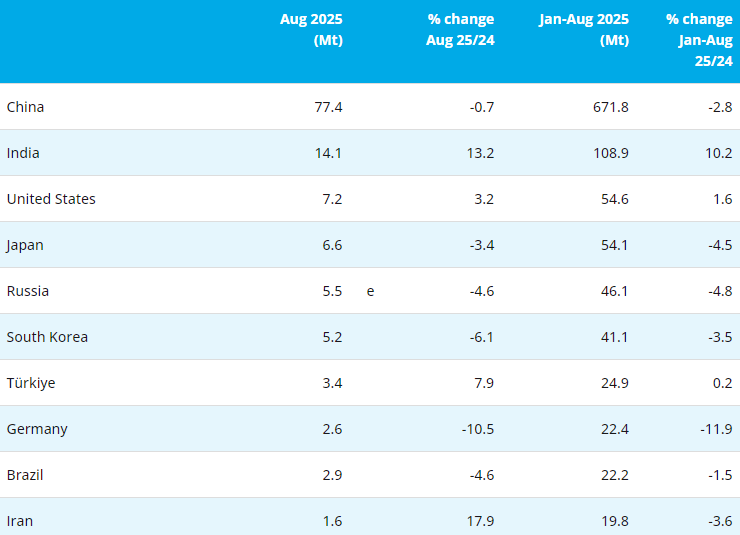Exports continued to drive the US ferrous scrap market while domestic demand remained weak as prices stayed stronger in Eastern markets due to export sales and competition for material.
The highest prices came from the Southeast, with one scrap processor exporting containers of material bound for India and possibly Pakistan. He reported shredded sales at $230-235/mt delivered port of Savannah.
Containers of heavy melting scrap No. 1 and 2 in an 80/20 blend netted
$225/mt, while cut plate and structural scrap fetched $230/mt, both delivered port of Savannah. With export activity robust, the processor told Platts that he was working harder to secure shredder feed in order to have enough material to meet demand. "It's so competitive down here; you have to pay the price and reach out [geographically] more," he said.
In the Northeast, dock prices appeared to get a little more competitive for cut and obsolete grades, possibly because exporters were coming closer to filling their orders. "I think cargoes are getting filled up," said one
Northeast scrap processor, who added that inquiries had slowed. "The exporter is not dumb -- they're not going to overpay." He was still shipping bulk material to the docks for export, selling heavy melting at $200/lt and plate/structural at $210/lt, both delivered to ports of New Jersey.
He was, however, tentative about next month. "I would be very nervous about speculating on an up market [for June]--my personal opinion is that there is some hesitation about what will happen with June buys," he said, adding that there could be some room to soften, except for prime grades. Busheling, he said, could go either way, with no supply coming out due mainly to manufacturing shutdowns by Ford and Chrysler. "But how much do they need," he asked rhetorically, wondering if a supply-constrained market mattered as US steelmakers continued to run at capacity utilization rates in the low 40% range.
An East Coast scrap processor now selling almost exclusively to exporters reported prices of $205-$210/mt for heavy melt and plate/structural at $10/mt more, both delivered to New Jersey export docks. He suggested that exporters, getting their orders filled for May, may be trying to push back a little on prices. "We'll see if they can," he quipped, claiming that exporters' abundant supply stream might slow if scrappers and mills begin to build stocks. "I think people in the Midwest are starting to get resistant to sell--those that can are starting to pile up scrap," he said. He told Patts that he had heard of some very favorable freights out of Savannah, which could explain the slightly higher dockside bids there.
Another Northeast processor reported domestic shredded sales between
$215/lt and $225/lt to his local mills, outside the Platts methodology but a clear sign that export prices were exerting at least some upward pull on his domestic business. The docks, he said, were still paying $220-230/mt delivered for containers of shredded scrap. He said that in addition to his local mill sales, he was continuing to load containers bound for India. His prime busheling sold for $225/lt delivered to local mills.
In yet another sign that export markets were the place to be for recyclers, Metalico CEO Carlos Aguero said that his firm would be directing substantially more of its activities toward export markets during the second quarter in order to capture the higher margins now available. He said that he was beginning to see the "some signs" of export prices pulling through to domestic prices but stipulated that domestic mills still had ample scrap in their systems which must be consumed before they come to market and generate any significant domestic demand.
As a final reality check, a Midwest mill scrap consumer said Midwest markets were some $15/lt less expensive than export prices, leaving the Platts reference price for shredded scrap at a midpoint of $190/lt delivered to Midwest mills. As for prime grades, he went even further than the Northeast processor, reporting that prices had softened to the $210-220/lt range "as fewer markets are available to sell into," suggesting that domestic mills really don't need that much prime, jibing with the Northeast processor's comments. (Platts)
Copyright © 2013 Ferro-Alloys.Com. All Rights Reserved. Without permission, any unit and individual shall not copy or reprint!
- [Editor:editor]



 Save
Save Print
Print Daily News
Daily News Research
Research Magazine
Magazine Company Database
Company Database Customized Database
Customized Database Conferences
Conferences Advertisement
Advertisement Trade
Trade













Tell Us What You Think